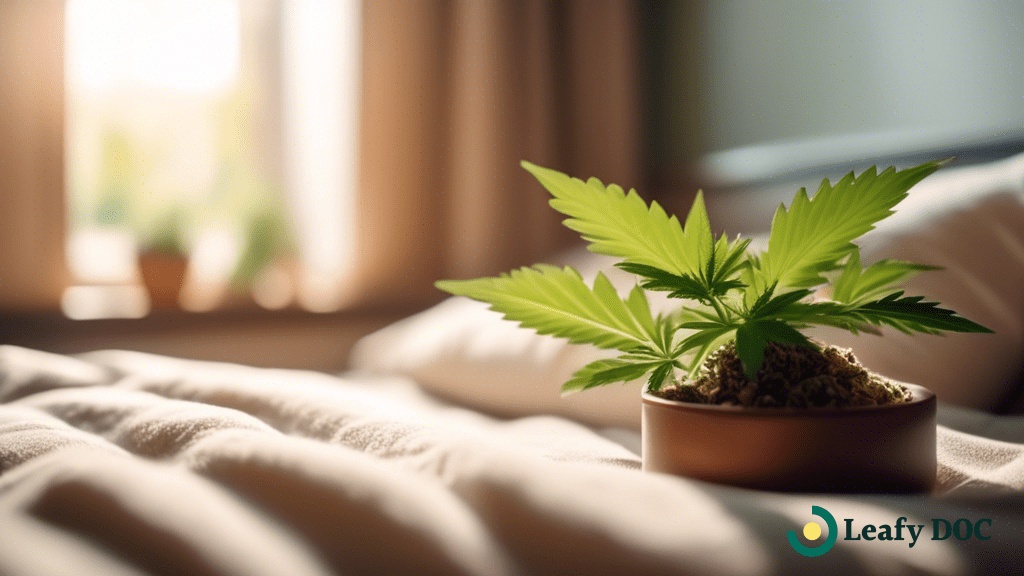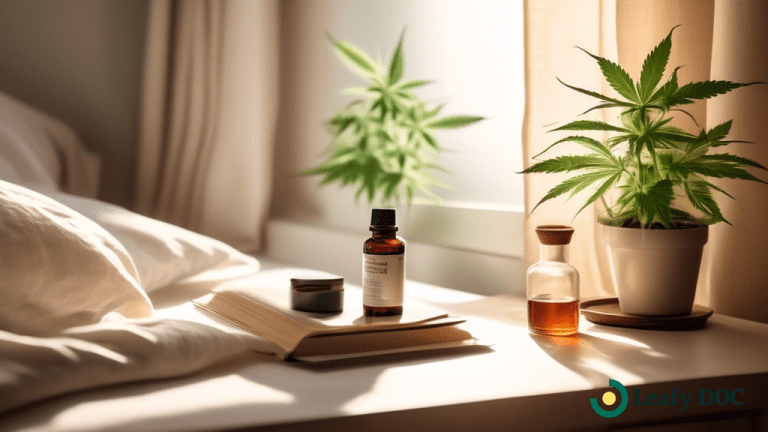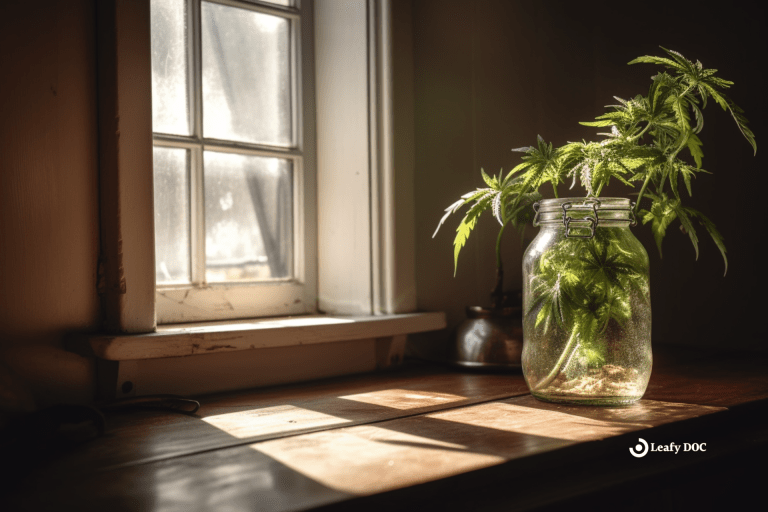Can Cannabis Help With Sleep Apnea?
by Ayesha Aziz · May 7, 2024
Explore the potential benefits of using cannabis to alleviate sleep apnea symptoms and improve your quality of sleep. Discover how this natural remedy could be the solution you’ve been looking for.

If you or a loved one suffer from sleep apnea, you know how disruptive it can be to your quality of life. The constant interruptions in breathing during sleep can lead to daytime fatigue, irritability, and even serious health complications.
You may have tried various treatments, from continuous positive airway pressure (CPAP) machines to lifestyle changes, but still struggle to get a good night’s rest. Have you ever considered turning to cannabis for help with your sleep apnea?
Many people have found relief from sleep apnea symptoms by using cannabis as a sleep aid. With its potential to relax the muscles and promote deep, restful sleep, cannabis may offer a natural alternative to traditional treatments.
But before you dive in, it’s important to understand the effects of cannabis on sleep apnea, the research studies that have been conducted, and the potential benefits and risks associated with using cannabis for this condition. Let’s explore whether cannabis can truly help you get the restful sleep you deserve.
Key Takeaways
- Cannabis can potentially improve sleep quality and reduce symptoms of sleep apnea
- It may have a calming effect on the mind and body, aiding in relaxation for better sleep
- Starting with low doses and choosing strains high in CBD is recommended
- Consultation with a healthcare provider and monitoring progress with a sleep journal are important steps to consider
Understanding Sleep Apnea
If you snore loudly and frequently stop breathing while you sleep, you may have sleep apnea, a condition that affects your breathing patterns during the night.
Sleep apnea can lead to interrupted sleep, daytime fatigue, and even serious health issues if left untreated.
It’s important to recognize the symptoms and seek medical advice if you suspect you may have sleep apnea.
Understanding the different types of sleep apnea, such as obstructive sleep apnea (OSA) and central sleep apnea, can help you better understand your condition and find the appropriate treatment.
OSA is the most common type of sleep apnea, occurring when the throat muscles relax and block the airway during sleep.
Central sleep apnea, on the other hand, is caused by the brain’s inability to send the proper signals to the muscles that control breathing.
By understanding the specific type of sleep apnea you have, you can work with your healthcare provider to find the best treatment options for better sleep and overall health.
Effects of Cannabis on Sleep
When you indulge in the green dream, your mind drifts away like a paper boat on a tranquil river, carrying you to the shores of peaceful slumber. Cannabis has been known to have a calming effect on the mind and body, helping you relax and unwind after a long day.
This relaxation can lead to an easier transition into sleep, making it a potential aid for those struggling with sleep apnea. Moreover, cannabis has shown promise in improving the quality of sleep by increasing the time spent in deep sleep stages.
This can be particularly beneficial for individuals with sleep apnea, as deep sleep is essential for restorative rest and overall health. By incorporating cannabis into your bedtime routine, you may find yourself waking up feeling more refreshed and rejuvenated, ready to take on the day with a renewed sense of energy.
Research Studies and Findings
Discover how marijuana may have a positive impact on your sleep patterns and breathing during the night. Research studies have shown promising results regarding the potential benefits of cannabis for individuals with sleep apnea. Here are four key findings that may resonate with you:
- Marijuana has been found to help improve sleep quality by increasing total sleep time and reducing the time taken to fall asleep.
- Some studies suggest that cannabis can aid in reducing the severity of sleep apnea symptoms, such as pauses in breathing during sleep.
- Certain compounds in marijuana may have anti-inflammatory properties that could help alleviate inflammation in the airways, potentially improving breathing patterns.
- Individuals with sleep apnea who use marijuana report feeling more refreshed and alert during the day, indicating better overall sleep quality and daytime functioning.
If you or someone you know struggles with sleep apnea, exploring the potential benefits of cannabis under medical supervision could be a step toward improving your sleep and overall well-being.
Potential Benefits and Risk
You might want to consider the potential advantages and risks associated with using this natural remedy for your sleep condition. Cannabis has been shown to potentially improve sleep quality by reducing the time it takes to fall asleep and increasing overall sleep time. However, it’s essential to be aware of the potential risks, such as dependence, impaired memory, and negative effects on lung health.
Here is a table to help you weigh the benefits and risks:
| Potential Benefits | Potential Risks |
|---|---|
| Improved sleep quality | Risk of dependence |
| Reduced time to fall asleep | Impaired memory |
| Longer overall sleep time | Negative effects on lung health |
| Potential relaxation effects | Possible impact on mental health |
It’s crucial to consult with a healthcare professional before incorporating cannabis into your sleep apnea treatment plan. They can help you navigate the potential benefits and risks and determine if it’s the right option for you. Remember, your health and well-being are essential, so make sure to prioritize them in your decision-making process.
Note: Empower yourself with knowledge about cannabis through Leafy DOC’s expert consultations. Our caring coaches are dedicated to providing personalized guidance tailored to your unique needs and preferences. Schedule your session today and embark on a journey toward holistic wellness and vitality.
Recommendations for Using Cannabis for Sleep Apnea
To improve your chances of a good night’s sleep, consider incorporating cannabis into your bedtime routine. Cannabis has shown promise in helping individuals with sleep apnea by promoting relaxation, reducing anxiety, and potentially improving breathing patterns during sleep. Here are some recommendations for using cannabis to manage sleep apnea:
- Start with low doses and gradually increase to find the right balance for you.
- Choose strains high in CBD, known for its calming effects.
- Experiment with different consumption methods such as vaping, edibles, or tinctures.
- Keep a sleep journal to track your progress and adjust as needed.
- Consult with a healthcare provider knowledgeable about cannabis use for sleep apnea.
Remember, everyone’s body reacts differently to cannabis, so it’s essential to listen to your body and adjust your routine accordingly. By incorporating cannabis into your bedtime routine with caution and guidance, you may find relief from sleep apnea symptoms and enjoy a more restful night’s sleep.
Frequently Asked Questions
Can cannabis be used in combination with other treatments for sleep apnea?
Yes, cannabis can be used in combination with other treatments for sleep apnea. It may help relax muscles and improve breathing during sleep. Consult with a healthcare provider to determine the best approach for your specific needs.
Are there different strains of cannabis that are more effective for treating sleep apnea?
For treating sleep apnea, some strains of cannabis like indica-dominant strains may be more effective due to their relaxing properties. Consider trying different strains to see what works best for you.
How does the method of consumption (smoking, edibles, oils, etc.) affect the effectiveness of cannabis for sleep apnea?
When choosing how to consume cannabis for sleep apnea, consider that smoking offers quick relief, while edibles provide longer-lasting effects. Oils can be a convenient option for precise dosing. Experiment to find what works best for you.
Are there any long-term side effects of using cannabis for sleep apnea?
Long-term side effects of using cannabis for sleep apnea may include memory issues, dependency, and lung irritation. It’s important to consult with a healthcare professional to monitor your usage and ensure overall well-being.
Can cannabis help with other symptoms of sleep apnea, such as daytime fatigue or mood disturbances?
Feeling exhausted and moody from sleep apnea? Cannabis can potentially help with symptoms like daytime fatigue and mood disturbances. It’s like finding a hidden oasis in the desert of sleep troubles.
Last Updated: May 6, 2024
Get Your Medical Card
Connect with a licensed physician online in minutes

Like This Article?
Share with your friends
Table of Contents
Keep Reading

Microdosing Cannabis For Sleep: A Comprehensive Guide To Sleep Disorders And Marijuana
Sleep better with microdosing cannabis! Our comprehensive guide explores sleep disorders, marijuana strains, and dosing techniques. Click now to revolutionize your sleep!

Is Marijuana A Blood Thinner?
Uncover the truth about marijuana’s blood thinning properties and their potential impact on your health. Click now to learn more and stay informed!

Finding The Best Medical Marijuana Dispensaries In Ohio
Discover the best medical marijuana dispensaries in Ohio to meet your needs. Click now for the ultimate guide and find your perfect match today!
